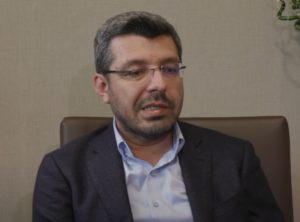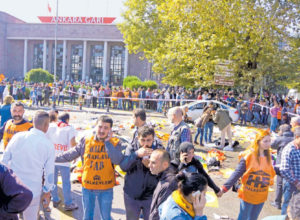Abdullah Bozkurt/Stockholm
New figures announced by Turkish Interior Minister Süleyman Soylu on detained Islamic State in Iraq and Syria (ISIS) suspects indicate that the leniency shown by the Turkish judiciary towards jihadist militants in the past has continued to the present day.
According to a statement made by Soylu on February 2, Turkish law enforcement agencies conducted 1,042 operations last year, detaining 1,981 people on suspected links to ISIS. Over 600 of them were formally arrested while the rest were let go, he said, meaning that two out three ISIS suspects were released by the police, prosecutors or the courts after brief detentions.
There have been 60 operations conducted against ISIS so far this year, resulting in the detention of 95 people. He did not provide figures on how many of these were actually arrested and jailed.
Soylu also revealed that the government has sent 1,126 ISIS militants of European origin back to Europe in the last five years.
The numbers on detentions and arrests tell only a partial story in Turkey’s campaign against ISIS as the Islamist government of President Recep Tayyip Erdoğan has often pursued a forgiving line when it comes to cracking down on violent jihadist groups.
Turkish law enforcement agencies periodically round up ISIS suspects, but most of them are let go, either at arraignment or during trial proceedings, with very few convicted. Even many of those who were convicted by criminal courts were acquitted when the rulings were overturned by appeals courts.

The systematic failure of the criminal justice system to crack down on the ISIS network is believed to be part of a government policy that instructs members of the judiciary to be lenient on ISIS suspects and to use every procedural flaw to undermine cases brought before the courts. Compounding matters further is the lack of focus by the judiciary on such cases since it instead concentrates on stifling dissent and punishing critics and opponents of the Erdoğan government through an abuse of criminal procedure.
The last time the Turkish public was informed about the number of ISIS militants in prison, convicted or still being tried as suspects, was on July 21, 2020, when then-Justice Minister Abdülhamit Gül stated that there were 1,195 ISIS arrestees and convicts in prison as of December 16, 2019. Of these 791 were foreign nationals, he added.
He did not say how many were serving time on successful ISIS convictions since many ISIS suspects were acquitted or their convictions were overturned by the Supreme Court of Appeals.
Since then, the government has not shared any figures on ISIS militants in prison and has adopted a new policy of not responding to either parliamentary questions submitted by opposition lawmakers in line with established procedure or citizens exercising their rights under the Right to Information Act. Motions filed by opposition parties to establish an investigation commission to probe the ISIS network in Turkey were killed by the majority votes of Erdoğan’s Justice and Development Party (AKP) and its allies.

In May 2022 a citizens’ petition seeking ISIS statistics filed with the Presidential Communications Center (CİMER) under the Right to Information Act failed to obtain the desired response from the government, which cited exceptions in the law concerning national security. The petition was referred to the Security Directorate General’s (Emniyet) counterterrorism department, which monitors ISIS cells in Turkey. But the bureau refused to share any data on ISIS terrorists in prison, effectively saying that the matter is of national security importance and that the public has no right to know about jailed ISIS militants.
Behind this shroud of secrecy lies the motivation to hide the Erdoğan government’s revolving door policy, which has been quietly implemented since 2014 across the criminal justice system. Prosecutors and judges get their instructions from Erdoğan’s office on how to go soft on radical groups that are part of the hard-core base of the ruling AKP.
The man who is in charge of executing this revolving door policy is Erdoğan’s personal lawyer, Mustafa Doğan İnal, who in the past represented notorious al-Qaeda suspects including Yasin al-Qadi, who was at one time designated by the UN and the US Treasury. With Erdoğan’s political backing, İnal, a radical Islamist figure himself, also orchestrated the acquittal of all 52 suspects in the case of Tahşiyeciler, an al-Qaeda-linked terrorist group in Turkey led by radical cleric Mehmet Doğan (aka Mullah Muhammed), who openly declared his admiration for Osama bin Laden and called for armed jihad in Turkey.
The probe revealed that the terrorist group had sent close to 100 people to Afghanistan for arms training. In seized tape recordings, Doğan was heard calling for violent jihad, saying, “I’m telling you to take up your guns and kill them.” He also asked his followers to build bombs and mortars in their homes, urged the decapitating of Americans, claiming that the religion allows such practices. “If the sword is not used, then this is not Islam,” he stated. According to Doğan, all Muslims were obligated to respond to then-al-Qaeda leader bin Laden’s armed fight.

Erdoğan vigorously defended the indicted cleric, helping him get acquitted by his loyalist judges and prosecutors when he was arrested and tried; jailed journalists who criticized his radical group; and even launched an unsuccessful civil suit in the US against Muslim scholar Fethullah Gülen for defaming the fanatic. The legal strategy for all of this was managed by İnal and his team.
In order to deflect international criticism on the lack of concrete action in cracking down on jihadist groups including ISIS, the Erdoğan government resorts to a tactic of inflating police detention figures, which do not translate into successful convictions and often end up in quick releases. That’s why the figures on convictions of ISIS suspects are treated as a state secret in Turkey.
Some of the ISIS cells in Turkey and Syria are under the control of Turkish intelligence agency MIT, which was funded, armed and directed to conduct operations promoting the Erdoğan government’s policy objectives in Turkey and abroad.
In an intelligence report published earlier by Nordic Monitor, it was revealed that İlhami Balı, the mastermind behind a string of deadly terrorist attacks in 2015 blamed on ISIS, was in fact working for MIT. The terror attacks helped Erdoğan maintain his regime and regain the majority in parliament he had briefly lost in the summer 2015 elections.
2015 was an exceptional year for Turkey in terms of back-to-back terrorist attacks that hurt the opposition parties, which were forced to cancel campaign rallies under the threat. On July 20, 2015, 33 people died in a suicide bomb attack in the Suruç district of Şanlıurfa province. On October 10, 2015, 103 people were killed in a bomb attack on a crowd gathered in front of the Ankara Train Station. Both were blamed on ISIS, although the terrorist group has never officially claimed responsibility for either.

The intelligence report showed that Balı stayed in a hotel under the control of Turkish intelligence agency MIT in Ankara on May 25-27, 2016. His connection to MIT suggested Balı’s actions were directed by the agency, which coordinated clandestine operations within ISIS to help President Erdoğan in elections.
Balı, born in Reyhanlı in the Turkish border province of Hatay on March 17, 1982, was operating in an al-Qaeda cell before joining the al-Nusra Front in the initial years of the conflict in Syria. Al-Nusra was supported by the Erdoğan regime, which was hoping to oust the Bashar al-Assad government in Damascus and replace it with an Islamist puppet regime.
A Turkish court had previously convicted Balı — in an investigation predating the 2011 Syrian crisis — on charges of membership in al-Qaeda and sentenced him to three years in prison. Balı relocated to Syria in 2012. He later moved to ISIS, which tasked him with serving as the ISIS border chief (emir) responsible for the smuggling of jihadists and logistical supplies and the transfer to Turkey of wounded ISIL militants along the Turkish-Syrian border.
In the general election of June 7, 2015, the ruling AKP lost its majority and was unable to form a government on its own for the first time since 2003. While it was predicted that a coalition government would be formed, a new election on November 1, 2015 was announced as permitted under the constitution by Erdoğan, who undermined the coalition negotiations. Between June 7 and November 1,862 people, including security officers, civilians and outlawed Kurdistan Workers’ Party (PKK) militants, lost their lives in Turkey.












